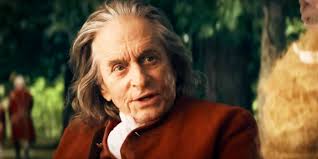Ben Franklin kept exceeding limitations.
That was true involving education. “He didn’t go to school past 12 years old,” said Michael Douglas, who plays him (shown here) in a mini-series that starts Friday on Apple TV+. So everything is sort of self-learned.
And it was true involving age. In 1776, where “Franklin” begins, he was already 70 or (some sources say) 71. By comparison, Washington was 44 or 45, Jefferson was 33, Hamilton was 21 or 19.
That senior citizen had a crucial assignment, Douglas, 79, told the Television Critics Association: “The Continental Congress decided, ‘Well, we need Ben,’ because he was was well-known around the world, to do sort of an undercover diplomatic trip to France, to get their support.”
So he headed there with his 16-year-old grandson Temple, for a charm offensive. That worked both ways, said Noah Jupe, 19, who plays Temple. There was “Benjamin seducing the French … and Temple being completely seduced by the French.”
Ben would return home eight years later and help pass the Constitution; Temple would spend most of his life in Europe. Both men had romantic adventures.
Ben, after all, “was very bright, but was a little bit of a rascal, too,” Douglas said. “He was a little bit of a philanderer, liked to imbibe, big flirt – and yet, had a wonderful ability in terms of negotiating, which was sort of a seduction.”
Yes, Franklin had his faults, some of them huge. He owned slaves and profited (via advertisements in his newspaper) from slavery. Both his wife and his son (a British loyalist) broke off contact with him. “I do not think being a good husband was one of his high points,” Franklin understated.
But his accomplishments were impressive, including inventions (bifocals, lightning rod, Franklin stove), government work (including as the first postmaster general) and writing (from pithy sayings to a small bit of work on the Declaration of Independence).
But the most important may have come near the end. As Rita Cooper Lee, an Apple spokesperson, put it:
“Franklin convinced France – an absolute monarchy – to underwrite America’s experiment in democracy …. Without that, America would not have won the revolution.”

“Franklin”: a charm offensive to save a revolution
Ben Franklin kept exceeding limitations.
That was true involving education. “He didn’t go to school past 12 years old,” said Michael Douglas, who plays him (shown here) in a mini-series that starts Friday on Apple TV+. So everything is sort of self-learned.
And it was true involving age. In 1776, where “Franklin” begins, he was already 70 or (some sources say) 71. By comparison, Washington was 44 or 45, Jefferson was 33, Hamilton was 21 or 19.
That senior citizen had a crucial assignment, Douglas, 79, told the Television Critics Association: “The Continental Congress decided, ‘Well, we need Ben,’ because he was was well-known around the world, to do sort of an undercover diplomatic trip to France, to get their support.” Read more…